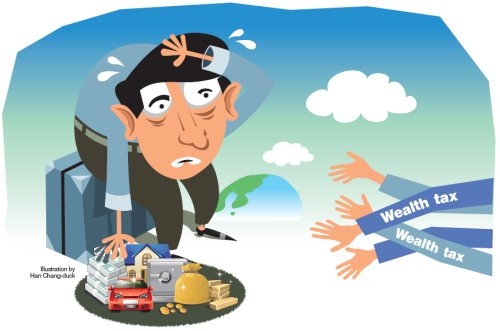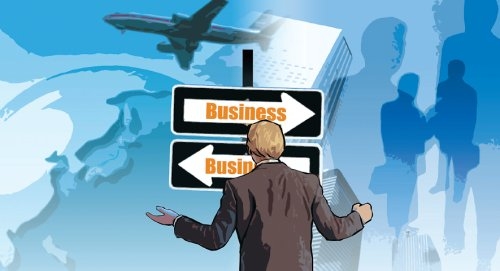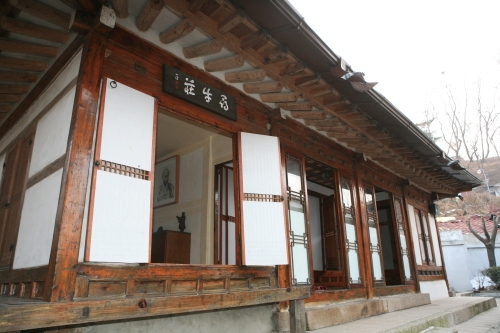Most Popular
-
1
Qoo10 liquidity crisis sparks massive complaints, fears of wider damage

-
2
Yoon urges municipalities to embrace foreigners

-
3
What is happening at Hybe?

-
4
S. Korea to consent to Japan's Sado mines gaining World Heritage status: official

-
5
Korea unveils tax reform bill to spur economy

-
6
Actor’s excessive airport security sparks probe into human rights violations

-
7
Man who let his father die due to financial difficulties to be released on parole

-
8
Actor Yoo Ah-in accused of sexual attack

-
9
S. Korea, China shifting from tensions to cooperation: Seoul

-
10
LG Electronics achieves record earnings in Q2

-
Readers’ voice
On the NSL ...In a democratic society, a government shouldn’t be in the business of patrolling people’s ideologies and belief systems. Isn’t that what free speech is all about?― Holly Hamilton, Gunpo, via Facebook On Internet censorship ...Teacher A: “How is the student in Class 6 when you teach class? He is not improving even though I’ve told him to pay better attention many times.”Teacher B: “It’s the same in my class, too.”If the above dialogue occurs on a Social Network Service like Twitter
Jan. 2, 2012
-
[VOICE] Should the National Security Law be abolished?
With response to Kim Jong-il’s death reigniting the debate ...Should the National Security Law be abolished?Divisive debateThe National Security Law has divided Korean public opinion since its introduction in 1948. To its proponents, more often on the conservative side of politics, the law is a necessary safeguard against North Korea and communist subversion of the state. To its critics, generally on the political left, it is used a tool to stifle criticism of the government and economic status
Jan. 2, 2012
![[VOICE] Should the National Security Law be abolished?](//res.heraldm.com/phpwas/restmb_idxmake.php?idx=633&simg=/content/image/2012/01/02/20120102001018_0.jpg&u=20120102190042)
-
[VOICE] Is current teacher evaluation effective?
More than 18 months after its introduction ...Is current teacher evaluation effective?Testing teachersTeacher Evaluation for Professional Development, a system to evaluate the performance of teachers at primary and secondary schools, was introduced in April 2010, after months of planning and debate. Under the system, fellow teachers, parents and students assess teachers using 18 criteria. High-performing teachers are rewarded with research opportunities, while those who score poorly must undergo
Dec. 26, 2011
![[VOICE] Is current teacher evaluation effective?](//res.heraldm.com/phpwas/restmb_idxmake.php?idx=633&simg=/content/image/2011/12/26/20111226001018_0.jpg&u=20111226201317)
-
[VOICE] Is punishment for sex crime too lenient?
With many cases causing public outrage ...Is punishment for sex crime too lenient?Scales of justiceA series of high-profile sex crime cases in recent years has caused public uproar over perceived leniency in sentencing. Perhaps most controversial of all was the punishment doled out to three teachers at Gwangju Inhwa School for sex crimes against deaf students. Two teachers were sentenced to six months and two years in prison for sexual assault, while the principal received a suspended sentence o
Dec. 19, 2011
![[VOICE] Is punishment for sex crime too lenient?](//res.heraldm.com/phpwas/restmb_idxmake.php?idx=633&simg=/content/image/2011/12/19/20111219001357_0.jpg&u=20111219221336)
-
Readers’ voice
On taxing the wealthy ...Can imposing a new tax on the wealthy narrow the gap between the poor and the rich? No. First, I don’t understand why the government is presenting such a poor policy as an alternative to solving the gap. Forcing the rich to pay more taxes doesn’t guarantee the poor’s improvement. It can shrink the whole economy of Korea and promote hidden trade and deals. For a better economy, the government should encourage the rich to spend more money. Instead, why doesn’t the governme
Dec. 14, 2011
-
Reader's Voice
On Incheon Airport...If a public enterprise is privatized, the general public tends to think we can have a variety of benefits such as improvement of service and price competitiveness through competition. However, if you take a close a look Incheon International Airport, you’ll realize that such thoughts are wrong.It has been in the black for seven consecutive years. A profit of 1.5 trillion won is expected this year. Especially because of 400 duty-free shops, good service and cheap prices, it i
Dec. 12, 2011
-
[VOICE] Should Incheon Airport be privatized?
Skyhigh sell-offThe President Lee Myung-bak administration proposed a partial privatization of Incheon International Airport in 2008 with a plan to sell off a 49 percent stake, including 15 percent to a foreign airport operator. Lee said the move would improve the competitiveness and efficiency of the country’s main gateway. The plan was ultimately shelved in the face of public antipathy. Last year, the Grand National Party drew up a bill for a similar plan, only to see it stalled indefinitely a
Dec. 12, 2011
![[VOICE] Should Incheon Airport be privatized?](//res.heraldm.com/phpwas/restmb_idxmake.php?idx=633&simg=/content/image/2011/12/12/20111212000998_0.jpg&u=20111212205102)
-
Should there be a new tax for the rich?
With GNP proposing higher rates on big earners ...Should there be a new tax for the rich?Taxing timesCalls for the imposition of a new tax for the nation’s richest have become part of the mainstream political discourse in Korea, echoing similar debate in the U.S. The most recent proposals for a tax on the wealthy have come from a somewhat unlikely source, the conservative Grand National Party. GNP Rep. Kim Sung-sik, backed by other reformist lawmakers, last month called for a new 40 percent tax
Dec. 5, 2011

-
Readers’ voice
On the FTA ...There should be little debate. Free trade means economic growth, more jobs, and lower inflation. It’s a win for both businesses and consumers in both countries. Without a doubt, certain industries will be hurt, but that is only a reflection of the fact that some industries have been protected from real competition and are thus inefficient. If you want to see a vibrant Korea, one which continues to grow its exports and its relevance in the international economy, then you really must
Nov. 28, 2011
-
[VOICE] Will the Korea-U.S. FTA be good for Korea?
With the deal finally passed ...Will the Korea-U.S. FTA be good for Korea?Rocky road to ratificationAfter years of bitter dispute, the Korea-U.S. Free Trade Agreement passed the National Assembly on Nov. 22 in dramatic fashion. But opposition to the controversial pact, which is expected to come into effect in January, has far from evaporated. Thousands of protestors have taken to the streets demanding the pact be scrapped or renegotiated, leading one local newspaper editorial to speculate whethe
Nov. 28, 2011
![[VOICE] Will the Korea-U.S. FTA be good for Korea?](//res.heraldm.com/phpwas/restmb_idxmake.php?idx=633&simg=/content/image/2011/11/28/20111128001054_0.jpg&u=20111128193502)
-
[Readers’ VOICE] On trade unions ...
On trade unions ...Korea’s constitution in Article 7, section 1, states that workers have the right to organize, bargain collectively and collective action for their working conditions.That is, three powers of labor workers can enjoy basically.Before trade unions, the owner of the company determined all things such as promotion, wage, retirement and so on.Under these conditions, the workers had no option and worked as the owner ordered. If a worker got hurt while working, medical expenses were p
Nov. 21, 2011
-
[VOICE] Are Korea’s trade unions too powerful?
With the Hanjin dispute finally resolved ...Are Korea’s trade unions too powerful?The influence of organized laborBy most measures, Korean trade unionism is at its lowest ebb in two decades. The union participation rate today of 9.8 percent is less than half of what it was in 1989. Among OECD countries, Korean workers’ unionization ranks near bottom. That does not mean that unions do not still wield considerable power. The recently ended labor dispute at Hanjin Heavy Industries & Construction is
Nov. 21, 2011
![[VOICE] Are Korea’s trade unions too powerful?](//res.heraldm.com/phpwas/restmb_idxmake.php?idx=633&simg=/content/image/2011/11/21/20111121000800_0.jpg&u=20111121200154)
-
Readers’ VOICE
On overseas adoption ...As an adoptive parent and part of a larger Korean family (both adoptees and Korean-born American citizens), I agree, in part, with both of you. Mr. Morrison’s argument is pragmatic, and I concur: as long as Korea continues to have one of the weakest networks of social programs of any industrialized Asian nation, which an infinitesimal amount of tax revenue going toward social programs, international adoption must continue.Dr. Johansson, arguments regarding Americans and E
Nov. 14, 2011
-
Is the biz climate good for foreigners?
With the nation ranking well in a recent report on business conditions ...Is the biz climate good for foreigners?Korea’s business climateSome of the many challenges of doing business in Korea as a foreigner are obvious. Language, a distinct and demanding work culture and an unfamiliar regulatory and legal environment are but a few of the obstacles to overcome. These would all be challenges for a budding foreign investor in any country. But how does Korea compare with other countries for the ease
Nov. 14, 2011

-
On foreign players ...
On foreign players ...If I start with the conclusion, I think more foreign players should be allowed in the K-League.Competition among players would be keener, increasing their performance in the league.But, because if we allowed foreign player without a limit, the national players would lose out, I think allowing 1-2 more foreign players from the present 4 players is proper.There is one more thing to talk about concerning the K-League,Look at the English Premier League. In the Premier League, t
Nov. 7, 2011
-
[VOICE] Should the K-League allow more foreign players?
With four currently allowed per team ...Should the K-League allow more foreign players?Playing at home and awayWith the exception of military club Sangju Sangmu, each of the K-league’s 16 teams is permitted to include up to three foreign players in its lineup, plus another from within the Asian Football Confederation. The number of foreign players allowed per club has varied since the league’s inception in 1983. From a maximum of three per team at the league’s outset, the limit reached a high of
Nov. 7, 2011
![[VOICE] Should the K-League allow more foreign players?](//res.heraldm.com/phpwas/restmb_idxmake.php?idx=633&simg=/content/image/2011/11/07/20111107000943_0.jpg&u=20111108112304)
-
Reader's VOICE
On overseas adoption...Why not? If babies can’t find a home here, there are tons of families around the world who would welcome a child of their own! The flipside I guess would be a loss of Korean identity. The foreign adoptive parents might not foster a sense of Korean identity in their child once he or she has grown up. Nonetheless, if the child can not be placed in Korea, the best alternative is to find a family, any family, who will welcome them and love them.― Desiree Althea Cooper, Gwangju
Oct. 31, 2011
-
[VOICE] Should overseas adoptions continue?
With Korea’s reputation as a ‘baby exporter’ ...Should overseas adoptions continue?Korea’s 220,000 kids overseasSouth Korea has the world’s oldest overseas adoption program, having sent an estimated 220,000 children abroad. In the aftermath of the Korean War, overseas adoptions were largely a mechanism for children to escape poverty and destitution, but in the decades that followed, societal attitudes were the primary driver of the phenomenon. Up to 90 percent of children born to unwed women are
Oct. 31, 2011
![[VOICE] Should overseas adoptions continue?](//res.heraldm.com/phpwas/restmb_idxmake.php?idx=633&simg=/content/image/2011/10/31/20111031000991_0.jpg&u=20111031202604)
-
Readers’ VOICE
On cultural heritage...When asked about cultural heritage, most people come up with Bulguksa, palaces and so on.But few think Hangeul is cultural heritage which is designated as a UNESCO World Heritage property.Therefore, I would like to talk about Hangeul.These days, animated by The Korean Wave, many countries are running Hangeul classes.Though it is through the Korea Wave, I would like to highly praise the government’s efforts.Also, I have some things I would like the government to do.The firs
Oct. 24, 2011
-
Is Korea looking after its cultural heritage?
After decades of rapid change ...Is Korea looking after its cultural heritage?Threats to Korea’s historyAs has been the case in many countries, Korea’s cultural heritage has faced numerous threats in both ancient and modern times. Japanese colonization and invasions by other foreign powers saw thousands of artifacts taken from the country, many of which have never been returned. It is estimated that 74,434 artifacts remain overseas, 46 percent of which are in Japan. In recent decades, rapid mode
Oct. 24, 2011














![[VOICE] Should the National Security Law be abolished?](http://res.heraldm.com/phpwas/restmb_idxmake.php?idx=633&simg=/content/image/2012/01/02/20120102001018_0.jpg&u=20120102190042)
![[VOICE] Is current teacher evaluation effective?](http://res.heraldm.com/phpwas/restmb_idxmake.php?idx=633&simg=/content/image/2011/12/26/20111226001018_0.jpg&u=20111226201317)
![[VOICE] Is punishment for sex crime too lenient?](http://res.heraldm.com/phpwas/restmb_idxmake.php?idx=633&simg=/content/image/2011/12/19/20111219001357_0.jpg&u=20111219221336)
![[VOICE] Should Incheon Airport be privatized?](http://res.heraldm.com/phpwas/restmb_idxmake.php?idx=633&simg=/content/image/2011/12/12/20111212000998_0.jpg&u=20111212205102)

![[VOICE] Will the Korea-U.S. FTA be good for Korea?](http://res.heraldm.com/phpwas/restmb_idxmake.php?idx=633&simg=/content/image/2011/11/28/20111128001054_0.jpg&u=20111128193502)
![[VOICE] Are Korea’s trade unions too powerful?](http://res.heraldm.com/phpwas/restmb_idxmake.php?idx=633&simg=/content/image/2011/11/21/20111121000800_0.jpg&u=20111121200154)

![[VOICE] Should the K-League allow more foreign players?](http://res.heraldm.com/phpwas/restmb_idxmake.php?idx=633&simg=/content/image/2011/11/07/20111107000943_0.jpg&u=20111108112304)
![[VOICE] Should overseas adoptions continue?](http://res.heraldm.com/phpwas/restmb_idxmake.php?idx=633&simg=/content/image/2011/10/31/20111031000991_0.jpg&u=20111031202604)
